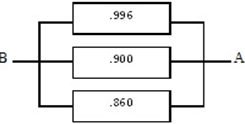1) Given the following reliabilities of components (Bridge will not collapse) in a series with reliabilities indicated. What is the probability someone can get from shore A to B using the bridges

2) Given the following reliabilities of components (Bridges), in parallel, determine the probability that someone can get from shore A to B.

3) Explain which bridges you would choose to attempt to use. (Assume you can put one foot on a bridge to see if it collapses before you attempt to cross.)
4) Assume you tested several automobile tires and recorded a Chi-sq. test, you decide that miles until failure are normally distributed, with mean failure of 50,000 miles and the standard deviation of failures was 10,000 miles.
a) Determine the reliability of the tires at 40,000 miles.
b) If you know one of these tires has been driven 20,000 miles (on a testing machine), what is its reliability at 60,000 miles?
5) Assume you are building a system (Aircraft, etc.) for a customer but using the best technology available. You cannot produce the reliability required. The customer requires reliability of .99 after the system (aircraft, etc.) has operated for 1000 hours. Your system (Aircraft, etc.) has a reliability of .80 after operating for 1000 hours. What can you do to meet the customers' required reliability? Explain in detail.